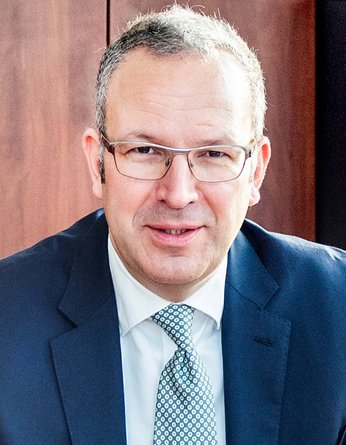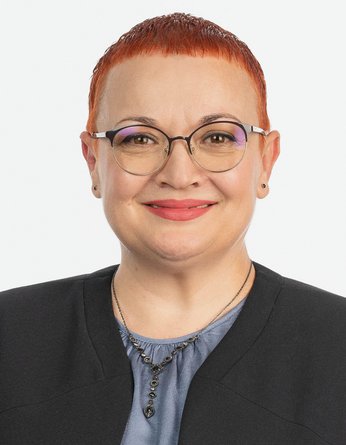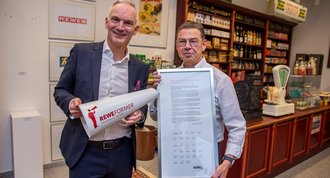
Als internationales Unternehmen bietet die REWE Group ihren Mitarbeitenden auch die Möglichkeit, ins Ausland zu gehen. one sprach mit Marion Steinhausen, die Entsendungswillige und ihre Vorgesetzten dabei unterstützt, sowie mit Arndt Riehl und Dana Popa, die den Sprung ins Ausland wagten.
Keine steuerlichen Nachteile, dafür viel Unterstützung beim Umzug und administrativen Themen: Wer für die REWE Group befristet in ein anderes Land geht, hat mit der aktuellen Entsenderichtlinie ein klar geregeltes Leistungspaket. Marion Steinhausen begleitet Entsendungswillige und ihre Vorgesetzten.
 Marion Steinhausen
one: Frau Steinhausen, die Entsenderichtlinie wurde 2018 komplett neu aufgestellt und alles, ob Prozesse oder Leistungen, neu standardisiert. Was bedeutet diese Standardisierung?
Marion Steinhausen
one: Frau Steinhausen, die Entsenderichtlinie wurde 2018 komplett neu aufgestellt und alles, ob Prozesse oder Leistungen, neu standardisiert. Was bedeutet diese Standardisierung?
Marion Steinhausen: Es bedeutet Gleichbehandlung für alle. Die Leistungspakete sind für alle gleich, ob Führungskräfte oder Mitarbeiter:innen, ob sie ins Ausland entsendet werden, oder aus dem Ausland zu uns kommen. Zudem war uns wichtig, marktgerecht zu agieren. Wir haben uns also umgeschaut: Wie verfahren andere Unternehmen, welche Bedürfnisse haben die Entsandten?
one: Können Sie ein Beispiel nennen?
Marion Steinhausen: Ja, zum Beispiel haben wir nun einen neuen Steuer-Ansatz. Das heißt: Mitarbeiter:innen, die entsendet werden, stellen sich im Ausland steuerlich weder besser noch schlechter als in Deutschland. Die Basis für die Versteuerung ist das jeweils aktuelle Gehalt. Denn natürlich soll niemand weniger verdienen, weil er oder sie ins Ausland geht. In manchen Ländern ist der Steuersatz niedriger, in anderen höher. Das gleichen wir aus. Die Entsandten haben nichts mit der jeweiligen Landes-Lohnsteuer zu tun, diese Steuer übernehmen wir.
one: Was ist mit meiner Sozialversicherung, wenn ich ins Ausland entsendet werde?
Marion Steinhausen: Wer über eine Entsendung im Ausland ist, ist weiterhin im Heimatland sozialversichert. Das sehen unsere standardisierten Prozesse vor und ist Bestandteil der EU-Verordnung, da wir hauptsächlich innerhalb der EU entsenden.
one: Was ist Ihre Aufgabe dabei?
Marion Steinhausen: Ich bin für die operative Beratung und Begleitung der Entsendewilligen, deren Führungskräfte und die HR-Kolleg:innen in den jeweiligen Entsendeländern da. Ich erstelle die Verträge, beauftrage externe Dienstleister zum Beispiel für die Wohnungssuche und bin die Schnittstelle zur Gehaltsabrechnung und zum Steuerberater.
one: Wie verläuft der Weg von der Idee bis zur Entsendung?
Marion Steinhausen: Der Weg könnte so verlaufen: Eine Entsendung ist Thema im Rahmen des KNP-Prozesses, oder eine Landesgesellschaft braucht für ein befristetes Projekt jemanden mit speziellen Kenntnissen und Fähigkeiten. Dann sucht die Führungskraft das Gespräch mit dem jeweiligen HR-Businesspartner und mit interessanten Kandidat:innen. Wir beraten in diesem Prozess die Führungskräfte und HR-Businesspartner und übernehmen im Weiteren die Abwicklung des Entsendeprozesses. Dann geht es für drei oder auch für maximal fünf Jahre ins Ausland.
one: Und nach drei oder fünf Jahren Entsendung?
Marion Steinhausen: Die Entsenderichtlinie enthält eine Rückkehrzusage für eine passende Stelle auf Konzernebene. Rund ein Jahr im Voraus, also nach zwei oder aber dann spätestens nach vier Jahren, kontaktiere ich die Führungskräfte im Einsatzland und im Heimatland sowie die HR-Businesspartner im Heimatland, die die Suche nach einem Job gemeinsam mit den Mitarbeiter:innen im Heimatland starten. Auf deren Wunsch sowie mit Einverständnis der Gesellschaft im Einsatzland kann der oder die Mitarbeitende auch vor Ort bleiben und auf einen lokalen Arbeitsvertrag wechseln, das nennen wir Lokalisierung.
one: Wo ist der Unterschied zwischen Entsendung und International Transfer?
Marion Steinhausen: Im Gegensatz zur Entsendung ist ein International Transfer unbefristet. Mitarbeiter:innen bewerben sich beispielsweise auf eine vakante Position bei einer Gesellschaft im Ausland, beenden ihr Arbeitsverhältnis im Heimatland und unterzeichnen einen lokalen Arbeitsvertrag. In diesem Fall ist man den Kolleg:innen vor Ort gleichgestellt, zahlt also im Einsatzsland Steuern und Sozialabgaben. Auch für International Transfer bieten wir ein, wenn auch reduziertes, Leistungspaket an.
one: Warum fördert die REWE Group mit dieser Entsenderichtlinie das Arbeiten im Ausland?
Marion Steinhausen: Die Strategie der REWE Group ist die Förderung der Internationalität ihrer Mitarbeiter:innen sowie der internationale Austausch von Know-how. Dabei sollen die Entsandten bestmöglich unterstützt werden, um sich in ihrem Einsatzland wohlzufühlen. Daher ist es uns sehr wichtig, auch mitreisende Angehörige mit verschiedenen Leistungen zu unterstützen.
Marion Steinhausen ist Consultant Mobility im Bereich Executive Contracts & Mobility (Holding)
Ein Vertrag zwischen Deutschland und Österreich und eine Tätigkeit bei REWE Far East fällt übrigens nicht unter „Entsendung“, sondern gilt immer als International Transfer.
Zur Person: Marion Steinhausen, HR Consultant Executive Contracts & Mobility, ist die Ansprechpartnerin für Entsendungen ins und aus dem Ausland.
Arnd Riehl wurde als CEO von Billa in die Slowakei entsandt. Bereits vor seinem Eintritt in die REWE Group konnte er zahlreiche Auslandserfahrungen in Israel, China und Skandinavien sammeln.
 Arnd Riehl
one: Warum haben Sie sich entschieden, ins Ausland zu gehen?
Arnd Riehl
one: Warum haben Sie sich entschieden, ins Ausland zu gehen?
Arnd Riehl: Eine wichtige Grundvoraussetzung waren meine zahlreichen positiven Erfahrungen im Ausland. Schon als 18-jähriger habe ich im Rahmen eines Sport- und Jugendaustauschs sechs Monate in Israel gelebt. Später folgten drei spannende Jahre in Shanghai, in denen ich den Markteintritt der Metro Cash & Carry Märkte in China mit aufgebaut habe. Eineinhalb Jahre habe ich für eine skandinavische Firma gearbeitet und vor meinem Wechsel zur REWE Group war ich im internationalen Einkauf im Bereich Marketing für mehr als 25 Länder verantwortlich.
Als ich vom Vorstand gebeten wurde, die Position in der Geschäftsführung von Billa in der Slowakei anzunehmen, habe ich deshalb nicht lange gezögert. Ich finde es spannend, die Welt zu entdecken und mich selbst und die Heimat nicht als Mittelpunkt zu verstehen. Ein weiterer Reiz liegt darin, globale Zusammenhänge besser zu verstehen und Menschen aus anderen Kulturen kennenzulernen.
one: Wie hat die REWE Group Sie dabei unterstützt?
Arnd Riehl: Die Unterstützung, die ich seitens der REWE Group erfahren durfte, war absolut vorbildlich. Sowohl die internationalen HR-Kolleg:innen als auch Frau Steinhausen waren jederzeit für Fragen und Anmerkungen erreichbar. Hervorzuheben ist in diesem Zusammenhang auch die qualitativ sehr gute Expat-Policy der REWE Group, angepasst an die individuellen persönlichen Rahmenbedingungen - in meinem Fall eine „Home Leave Allowance“, die es mir ermöglicht, an den Wochenenden zu meiner Familie nach Hause zu pendeln. Da ein Auslandseinsatz viele steuerlichen Fragen aufwirft, finde ich zudem die professionelle Begleitung durch ein professionelles Wirtschaftsprüfungsunternehmen sehr hilfreich.
one: Wie vereinbaren Sie als Pendler Beruf und Familie? Gab es hierbei Unterstützung von der REWE Group?
Arnd Riehl: Die Slowakei ist zum Pendeln perfekt – dank der guten Flugverbindung über Wien benötige ich nur vier Stunden vom Büro in Bratislava bis nach Hause. Grundvoraussetzung ist, dass der Partner oder die Partnerin die Entscheidung umfassend unterstützt und mitträgt - die Lebensumstände ändern sich meistens mehr für den in der Heimat gebliebenen Teil der Familie. Bei der Vereinbarkeit von Beruf und Familie ist weniger die Unterstützung der REWE Group ausschlaggebend, sondern vielmehr die eigene Flexibilität - gepaart mit dem Mut zur Veränderung und dem Willen, etwas global zu bewegen.
Arnd Riehl ist seit September 2016 bei der REWE Group beschäftigt.
Im Juli 2020 wurde er als CEO von Billa in die Slowakei entsandt. Er ist verheiratet und hat keine Kinder.
Dana Popa, Leiterin Human Resources zog vor zwei Jahren von Rumänien nach Österreich. Wir sprachen mit ihr darüber, wie sie und ihre Familie in der neuen Heimat angekommen sind.
 Dana Popa
one: Warum haben Sie sich 2019 entschieden, von Bukarest nach Wien zu ziehen?
Dana Popa
one: Warum haben Sie sich 2019 entschieden, von Bukarest nach Wien zu ziehen?
Dana Popa: Ich wollte den nächsten Schritt in meiner Karriere gehen. In Bukarest habe ich als Leiterin HR für PENNY Rumänien gearbeitet. Das Angebot, als Leiterin HR für Billa CEE in Wiener Neudorf zu arbeiten, gab mir die Möglichkeit, einen Schritt weiter zu gehen. Jetzt bin ich für die HR-Strategie von vier CEE-Ländern verantwortlich: Slowakei, Tschechien, Bulgarien und Litauen. Unsere Arbeit betrifft über 20.000 Angestellte. Darüber hinaus führe ich ein kleines Team von fünf Kolleg:innen.
one: Ihre neue Position war keine befristete Stelle, sondern ein Standortwechsel, ein International Transfer. Das bedeutet, Sie mussten ihren Job in Rumänien kündigen. Sie haben einen Mann und zwei Töchter, wie haben sie reagiert, als Sie zum ersten Mal mit ihnen über Ihre Umzugspläne gesprochen haben?
Dana Popa: Die Entscheidung umzuziehen war nicht einfach, aber auch nicht besonders schwer. Mein Mann ist selbstständig und sehr flexibel, wenn es um den seinen Arbeitstandort geht. Meine Töchter waren tatsächlich begeistert von der Idee, in ein anderes Land zu ziehen. Allerdings gab es vorab in Bukarest einiges zu organisieren. Zudem stand meine ältere Tochter kurz kurz vor ihrem Schulabschluss, so dass ich zunächst alleine nach Wien gezogen und alle zwei Wochen nach Bukarest gependelt bin. Erst im zweiten Jahr ist meine Familie nachgezogen. Insofern war die Entscheidung selbst nicht schwer, aber das erste Jahr war es, aufgrund der Umstände.
one: Wie haben Sie sich in Österreich eingelebt?
Dana Popa: Wie gerade schon erwähnt, war es am Anfang nicht ganz einfach. Zudem sprach ich kein Deutsch. Im Job sind wir ein internationales Team. Dort ist das kein Problem - aber im Alltag manchmal schon, wenn zum Beispiel ein Nachbar vorbeikommt und ein wenig plaudern möchte. Glücklicherweise ist Wien eine multikulturelle Stadt, in der viele Menschen Englisch sprechen. Insofern war die Sprache anfangs eine Herausforderung, aber kein wirkliches Problem. Zudem habe ich schnell damit begonnen, Deutsch zu lernen und mein Lehrer sagt, ich mache Fortschritte. Wir haben eine gute Schule für unsere jüngere Tochter gefunden, wo sie auch Deutsch lernt. Meine ältere Tochter ist nicht mit uns umgezogen, denn sie studiert im Ausland. Dazu kommt, dass Wien eine wunderschöne Stadt ist und die Menschen - insbesondere meine Kolleginnen und Kollegen - mich sehr gut aufgenommen haben."
one: Sie waren eine der ersten Mitarbeitenden, die im Rahmen der neuen REWE Group-Richtlinie für International Transfers gewechselt sind. Wie hat die REWE Group Sie hierbei unterstützt und Ihnen mit Bürokratie und Wohnungssuche geholfen?
Dana Popa: Ich arbeiten im Bereich Human Resources. Daher waren mir bis zu einem gewissen Grad die Aspekte meines Standortwechsels bekannt. Besonders hilfreich war für mich die Unterstützung bei der Wohnungssuche. Auch die Hilfe bei administrativen und steuerlichen Fragen war extrem nützlich.
Dana Popa arbeitete von 2012 bis 2019 als HR-Managerin für PENNY Rumänien. Sie zog 2019 nach Wien, um dort als Leitung HR für Billa CEE zu arbeiten.
Dana Popa ist 50 Jahre alt, verheiratet und hat zwei Töchter.
» ENGLISH VERSION «
As an international company, REWE Group offers its employees the opportunity to go abroad permanently or for a limited time period. one spoke to Marion Steinhausen, who supports those willing to assign and their Managers, as well as to Arnd Riehl and Dana Popa, who dared to make the leap abroad.
No tax disadvantages, but a lot of support with paperwork, moving or returning: Anyone who temporarily moves to another country for the REWE Group has a clearly regulated service package with the current International Assignment Policy. Marion Steinhausen accompanies those who want to be posted and their superiors.
 Marion Steinhausen
Marion Steinhausen: It means equal treatment for everyone. The benefits packages are the same for everyone, whether managers or employees, whether being assigned to a location abroad or from abroad. An important aspect for us was to act in line with market requirements. So we looked around at what other companies are doing and at the needs of the assigned workers.
Marion Steinhausen
Marion Steinhausen: It means equal treatment for everyone. The benefits packages are the same for everyone, whether managers or employees, whether being assigned to a location abroad or from abroad. An important aspect for us was to act in line with market requirements. So we looked around at what other companies are doing and at the needs of the assigned workers.
one: Can you give an example?
Marion Steinhausen: Yes, for example, we now have a new tax approach. This means that employees who are posted are neither better nor worse off in respect of taxation than they were in their home country before the assignment. Their current salary is the basis for taxation. Because, naturally, no one should earn less when on a posting. The tax rate may be lower is some countries and higher in others, and we compensate for that. Income tax in the host country does not apply to the posted employees.
one: What happens with social security for international assignments?
Marion Steinhausen: Employees who are assigned abroad continue to make social contributions in their home country. The EU regulation and our standardised processes both provide for this and we mainly assign employees within the EU.
one: What is your role in all of this?
Marion Steinhausen: I am there to provide operational advice and support for employees who volunteer for a posting, their managers and the HR colleagues in the various host countries. I prepare the contracts, commission external service provides to support the process or accommodation search, and I am the central point of contact for payroll and tax advisors.
one: How does a posting come about?
Marion Steinhausen: It goes something like this: an assignment may be agreed upon in the context of the KNP process or there may be a need in a national subsidiary for special knowledge and skills for a limited project. The manager requests meetings with the responsible HR business partner and interested candidates. Our role in this process is to advise managers and HR business partners and also assume responsibility for managing the posting process. The employee then goes abroad for three or even up to five years.
one: And after the three or five years?
Marion Steinhausen: The International Assignment Policy contains a promise for a suitable position at group level upon the employee’s return. Around one year in advance of the return, that is, after two or four years at the latest, I contact the managers in the host country and home country and the HR business partners in the home country, who then start looking for a job in the home country together with the employees. At the employee’s request and with the consent of the company in the host country, the employee may also opt to remain in the host country and transfer to a local employment contract (localisation).
one: What is the difference between a posting and an international transfer?
Marion Steinhausen: Unlike an assignment, an international transfer is for an indefinite period. Employees can, for example, apply for a vacancy at a company abroad, terminate their employment relationship in the home country and sign a local employment contract. In this case you are on equal terms with your local colleagues, so you pay taxes and social security contributions in your country of work. We also offer a benefits package for international transfers.
one: Why is the REWE Group promoting working abroad with this International Assignment Policy?
Marion Steinhausen: The REWE Group strategy is to promote an international mindset among its employees and facilitate the international sharing of expertise. Integral to this is giving the posted workers the best possible support to ensure that they feel at home in their host country. It is therefore also important to us to offer a range of benefits to support accompanying partners or family members.
A contract between Germany and Austria and employment at REWE Far East does not fall under the category of ‘assignment’; it is always considered an international transfer.
About Marion Steinhausen: Marion Steinhausen, HR Consultant Executive Contracts & Mobility, ist die Ansprechpartnerin für Entsendungen ins und aus dem Ausland.
Arnd Riehl was posted to Slovakia as CEO of Billa. Even before joining REWE Group, he had the opportunity to gain extensive experience abroad in Israel, China and Scandinavia.
 Arnd Riehl
one: What made you decide to go abroad?
Arnd Riehl
one: What made you decide to go abroad?
Arnd Riehl: An important factor in my decision was the many positive experiences I had already had abroad. Even at the relatively young age of 18, I spent six months in Israel as part of a sports and youth exchange. And later, I had three exciting years in Shanghai, during which I helped manage the market entry of the Metro Cash & Carry supermarkets in China. I also worked for a Scandinavian company for one and a half years and, before joining the REWE Group, I worked in marketing as an international purchasing manager for more than 25 countries.
That’s why I didn’t hesitate for a minute when I was asked by the Management Board to accept the CEO position for Billa in Slovakia. I find it exciting to discover new places and not see myself or my home country as the centre of the world. I also enjoy getting to know people from other cultures and find that working abroad helps to put things in a global context.
one: How did the REWE Group support you in this?
Arnd Riehl: The support I received from the REWE Group was exemplary. The international HR colleagues and Ms Steinhausen were always available for questions and comments. The REWE Group’s exceptional expat policy deserves a special mention too as it is tailored to your individual circumstances. In my case, I was granted a home leave allowance, which means I am able to commute home to my family at weekends. Since a posting abroad raises many tax questions, I have also found the professional support provided by the auditing firm Deloitte very helpful.
one: How do you manage your work-life balance as a commuter? Did you receive any support in this from REWE Group?
Arnd Riehl: Slovakia is perfect for commuting. Thanks to the good flight connections via Vienna, it only takes four hours to travel from the office in Bratislava to my home. Naturally, your partner has to be involved in and fully support the decision – it does impact your circumstances, particularly for the family remaining in the home country. When it comes to balancing work and family life, it is less about the support from the REWE Group and more about your own flexibility, combined with the courage to embrace change and the will to make a difference in the world.
Dana Popa relocated from Romania to Austria two years ago. We talked to her about how she and her family adjusted in the new city.
 Dana Popa
one: Why did you decide to move from Bucharest to Vienna?
Dana Popa
one: Why did you decide to move from Bucharest to Vienna?
Dana Popa: I wanted to take the next step in my career. In Bucharest I worked as a Human Resource Manager for PENNY Romania. The position offering as an HR Manager for Billa CEE in Vienna gave me the opportunity to move ahead and be responsible for the HR strategy in vier CEE countries: Slovakia, Czech Republic, Bulgaria and Lithuania. Our work impacts more than 20.000 employees. In addition, I lead a small team of five colleagues.
one: Your new position was not just a temporal assignment, but a relocation that meant you had to quit your job and leave Romania. You have a husband and two daughters. How did they react when you first talked to them about the change of place?
Dana Popa: The decision to move was not easy, but not so hard, also. My husband has his own business. He is very flexible as to where he works. My daughters were in fact quite excited about moving to a different country. But because there were many things to organize and my older daughter was close to finishing high school, I spent my first year in Vienna alone, commuting to Bucharest every two weeks. It was not until the second year that my family moved to Vienna, as well. So the decision to relocate was not so hard, but the first year was, because of our circumstances.
one: How did you adjust in Austria?
Dana Popa: In the beginning it was not easy, because of the reasons I just mentioned. Also, I did not speak German. At work we are an international team, so this was not a problem. But in everyday life it may be, for example when you go shopping or your neighbor comes around and wants to chat. Fortunately, Vienna is a multicultural city and many people speak English, so the language was a challenge in the beginning, but not really an issue. I started taking German classes, as well. My teacher tells me I am making progress. We took good care to find the right school for our younger daughter where she learns the language. My oldest daughter did not move with us. She studies at a university abroad.
one: You were one of the first employees who relocated under the new Group Policy on International Assignments and International Transfers. How did REWE Group support and help you with bureaucratic issues or finding an apartment?
Dana Popa: I work in Human Resources. So, on a certain level I was familiar with all the aspects that you have to deal with when you relocate. What I found very helpful was that REWE International helped me finding an apartment. They also assisted me with all the administrative and fiscal issues you have to deal with, for example questions about taxation. That I found extremely helpful.
Dana Popa worked as Human Resource Manager for PENNY Romania from 2012 to 2019. Then she moved to Vienna to start as HR Manager for Billa CEE.
Dana Popa is 50 years old. She is married and has two daughters.







